Book 7 of 2026: Sunward by William Alexander.
Fifth Philip K. Dick award nominee of the year. As such, not reviewed.
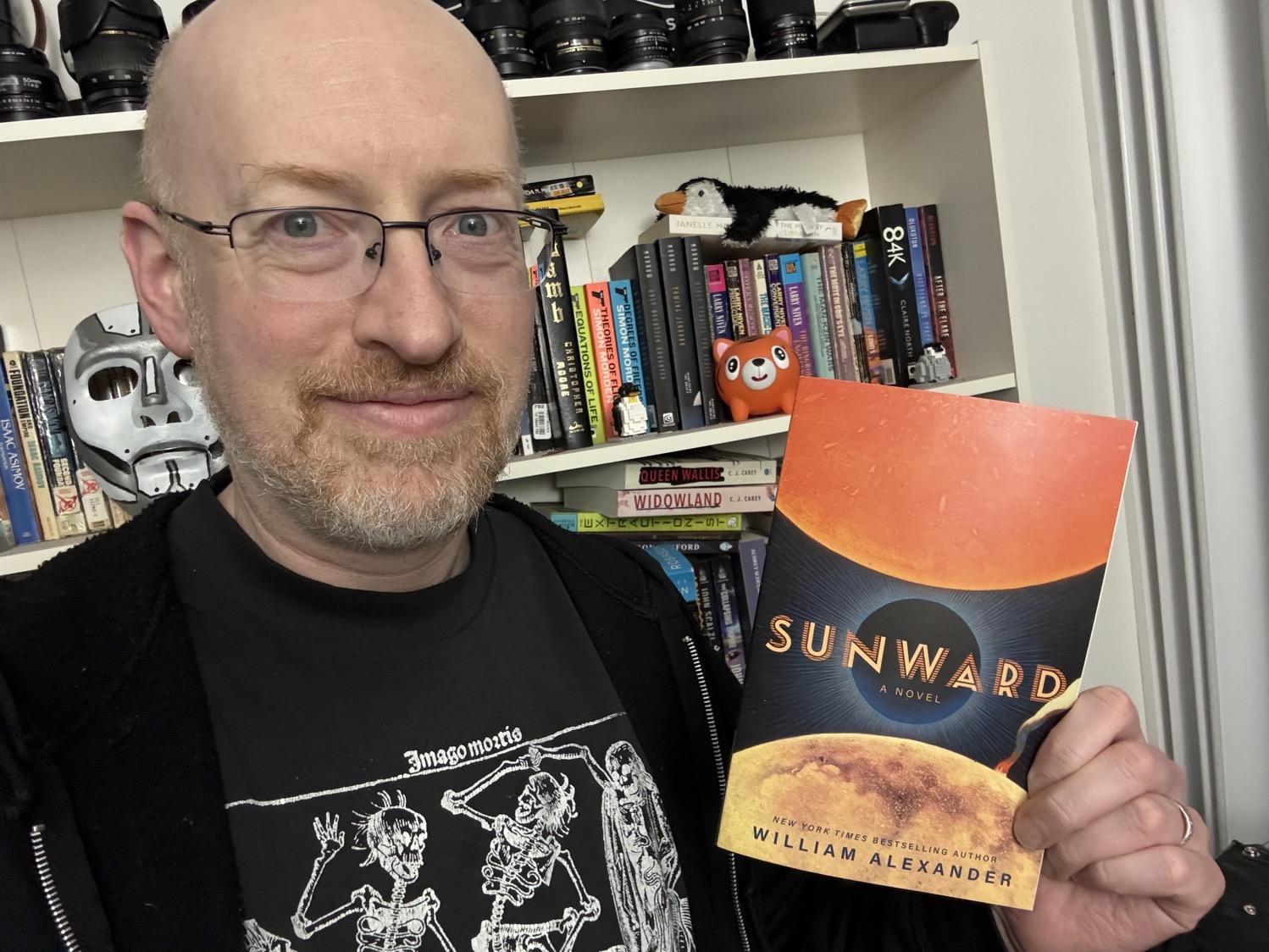
Enthusiastically Ambiverted Hopepunk
Book 7 of 2026: Sunward by William Alexander.
Fifth Philip K. Dick award nominee of the year. As such, not reviewed.

Maybe eventually I’ll get back to a weekly cadence? Maybe. We’ll see.
🚀 Last weekend was the penultimate planning meeting for this year’s Norwescon. Just one more in March, and then the convention in April. This is crunch time, but it’s always an exciting crunch time.
🚗 Here at home, our big adventure this weekend was going through with something we’d been considering for quite some time, and trading in our 2016 Chevy Sonic for a fancy new 2026 Honda Civic Sport Touring Hybrid sedan! We’d been looking forward to finally moving to a hybrid car for a while, we’d had a Civic before that we really liked, and the current model is one of the top-rated cars out right now, so we decided the time was right. It’s only been a day so far, but we’re definitely enjoying the upgrade. This is our second time buying a brand-new car, and it’s always fun driving a car off the lot when its odometer is still in the low two digits.


I’ve finished two more of this year’s Philip K. Dick nominees: M. R. Carey’s Outlaw Planet and Christopher Hinz’s Scales.
We finished a rewatch of 30 Rock, which though not without the occasional stumble and cringe moment, is still really funny and overall still holds up remarkably well.
I’m getting started getting some practice time in before DJing the Thursday night dance at Norwescon, and as usual, am recording my practice sessions and uploading them. My first of this stretch got posted: Difficult Listening Hour 2026.02.16. More to come!
Mike Masnick at TechDirt: NBC Hid The Boos For JD Vance. Where’s Trump’s ‘Unfair Editing’ Lawsuit?: “This is what an attack on press freedom looks like. It’s not a single dramatic moment. It’s a slow accretion of pressure—lawsuits that are expensive to fight even when you win, regulatory approvals that get held hostage, implicit threats that keep executives up at night—until media companies internalize the lesson. The lesson isn’t ‘be accurate’ or ‘be fair.’ The lesson is: make us look good, or face the consequences.”
Jon Schuppe and Natasha Korecki at NBC News: Broken bones, burning eyes: How Trump’s DHS deploys ‘less lethal’ weapons on protesters: “NBC News reviewed dozens of incidents since the spring and found that Department of Homeland Security officers have repeatedly deployed ‘less lethal’ weapons in ways that appear to violate their own policies or general policing guidelines, unless they believed their lives were in danger. The review was based on interviews with lawyers, experts and protesters who were injured as well as witness statements, documents from criminal and civil cases and videos taken at protests.”
Jay Kuo: Censoring Colbert and Talarico (archive.is copy of a Substack post): “Last night, Democratic Texas state Rep. James Talarico, currently running for the U.S. Senate, appeared on ‘The Late Show with Stephen Colbert’ to spread his message of hope and unity in the face of MAGA Trumpism. ¶ But millions who tuned in would not see that interview. That’s because the FCC blocked CBS, which owns ‘The Late Show,’ from airing it.”
Karl Bode at TechDirt: Department Of Education Forced To Back Off Illegal Plan To Be Racist, Sexist Assholes: “One recurring theme of this era: folks who actually choose to stand up to this bumbling kakistocracy of hateful failsons usually tend to win if they stick together. Those that prematurely bend the knee in abject cowardice (like say, CBS, countless law firms, or numerous university administrators) will hopefully be remembered for it. ¶ It happened again this week, when the Department of Education (DOE) was forced to back off of their illegal effort to permanently enshrine intolerance and ignorance across U.S. education standards.”
Jenny Kleeman at The Guardian: ‘Don’t go to the US – not with Trump in charge’: the UK tourist with a valid visa detained by ICE for six weeks: “She didn’t know it at the time, but it was the beginning of an ordeal that would see Karen handcuffed, shackled and sleeping on the floor of a locked cell, before being driven for 12 hours through the night to an Immigration and Customs Enforcement (ICE) detention centre. Karen was incarcerated for a total of six weeks – even though she had been travelling with a valid visa.”
Jordan Golson: What They Copied (Wayback Machine archive of a Substack post): “Then carmakers looked at a product that sold billions of units [(the iPhone)] and said, we should put one of those in the dashboard. But they took the wrong lesson. Your car isn’t supposed to do everything. It’s supposed to be a car. You need to adjust the temperature, change the volume, turn on the heated seats and keep your eyes on the road. These are not problems that require a general-purpose interface. They are problems that have been solved for more than a century — by knobs and buttons and switches — and the industry unresolved them in a decade.” I will never be in the market for a Ferrari, but this is a fascinating look at how Jonny Ive, famed for his design work at Apple, is working with them.
Angela Haupt at Time: The Internet’s New Favorite Insult: ‘Did AI Write That?’: “Across the internet, as tools like ChatGPT, Claude, and Gemini become part of everyday life, people are increasingly informing others that their words come across as AI output. You can practically feel the disdain through the screen: ‘Did AI write that?’ It’s not really a question—it’s a way of ending a conversation by casting doubt on whether someone deserves to be taken seriously.”
Richard MacManus at Cybercultural: 1994: Publishing comes to the Web — and design matters: “1994 marks the Web’s shift into a publishing medium. As site authors seek control over formatting and design, the WWW-Talk mailing list hosts an early debate over style sheets and presentation.” While I just slightly miss the 1994 cutoff of this article, my first website went up in 1995, and I have a 1996 archive still online.
Trae Dorn: Discord Just Showed Why We Need to Bring Back Forums: “Setting up independent forums is the only way to ensure that our communities are no longer at the whims of corporations that fundamentally do not care about us or our online safety. Use fake names. Hide your personal information. Only share what you want to share. ¶ Use the internet like it’s 2006.”
Thomas Germain at the BBC: I hacked ChatGPT and Google’s AI – and it only took 20 minutes: “It turns out changing the answers AI tools give other people can be as easy as writing a single, well-crafted blog post almost anywhere online. The trick exploits weaknesses in the systems built into chatbots, and it’s harder to pull off in some cases, depending on the subject matter. But with a little effort, you can make the hack even more effective. I reviewed dozens of examples where AI tools are being coerced into promoting businesses and spreading misinformation. Data suggests it’s happening on a massive scale.”
Marcin Wichary: Unsung Heroes: Flickr’s URLs Scheme: “The user interface of URLs? Who types in or edits URLs by hand? But keyboards are still the most efficient entry device. If a place you’re going is where you’ve already been, typing a few letters might get you there much faster than waiting for pages to load, clicking, and so on. It might get you there even faster than sifting through bookmarks. Or, if where you’re going is up in hierarchy, well-designed URL will allow you to drag to select and then backspace a few things from the end. ¶ Flickr allowed to do all that, and all without a touch of a Shift key, too.”
tante: Acting ethically in an imperfect world: “I appreciate a lot of work Cory Doctorow has done in the last decades. But the arguments he presents here to defend his usage of LLMs for this rather trivial task (which TBH could probably be done reasonably well with traditional means) are part of why the Internet – and therefore the world – looks like it does right now. It’s a set of arguments that wants to delegitimize political and moral actions based on libertarian and utilitarian thinking.”
Victor Tangermann at Futurism: Realtor Uses AI, Accidentally Posts Listing for Rental Property With Demonic Figure Emerging From Mirror: “Renters seeking a new home in the capital made a horrifying discovery while browsing listings: what can only be described as an Eldritch horror poking her disfigured head out — from somehow both inside and outside — of a bathroom mirror.”
Jon Brodkin at Ars Technica: Wikipedia blacklists Archive.today, starts removing 695,000 archive links: “The English-language edition of Wikipedia is blacklisting Archive.today after the controversial archive site was used to direct a distributed denial of service (DDoS) attack against a blog. ¶ In the course of discussing whether Archive.today should be deprecated because of the DDoS, Wikipedia editors discovered that the archive site altered snapshots of webpages to insert the name of the blogger who was targeted by the DDoS.” Ugh. I’ll need to figure out another source for linking to archived copies of paywalled/Substack-ed articles.
Book 6 of 2026: Scales by Christopher Hinz.
Fourth Philip K. Dick award nominee of the year. As such, not reviewed.
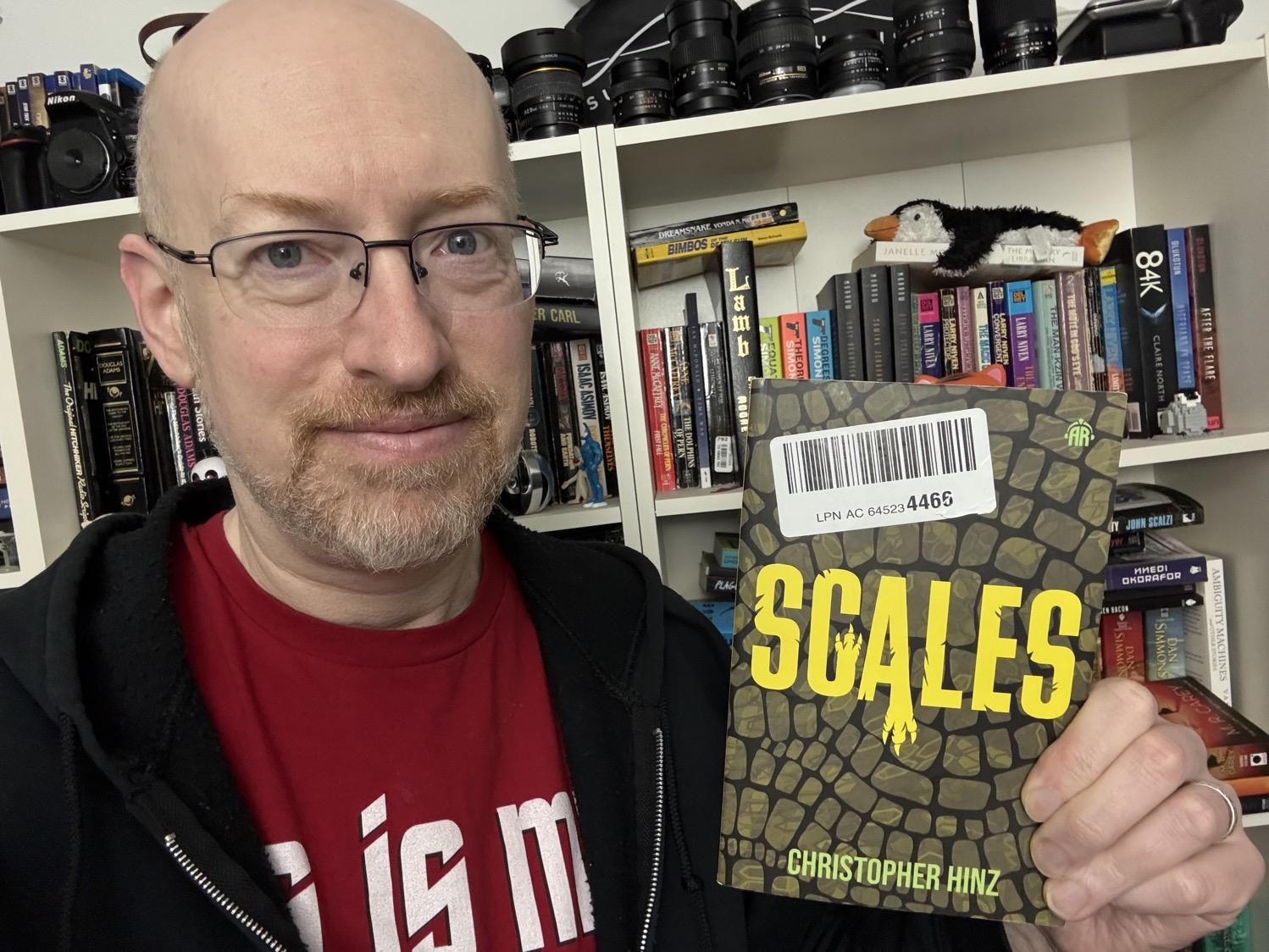
A random selection of lower-tempo (sub-100bpm) favorites. Just getting back into the swing of things after many months away. Got a gig coming up again, so time to get some practice in! There are a couple definite goofs in here; just picture everyone in the club turning to good-naturedly point and laugh at the DJ before going back to dancing. :)
Book 5 of 2026: Outlaw Planet by M. R. Carey.
Third Philip K. Dick award nominee of the year. As such, not reviewed.
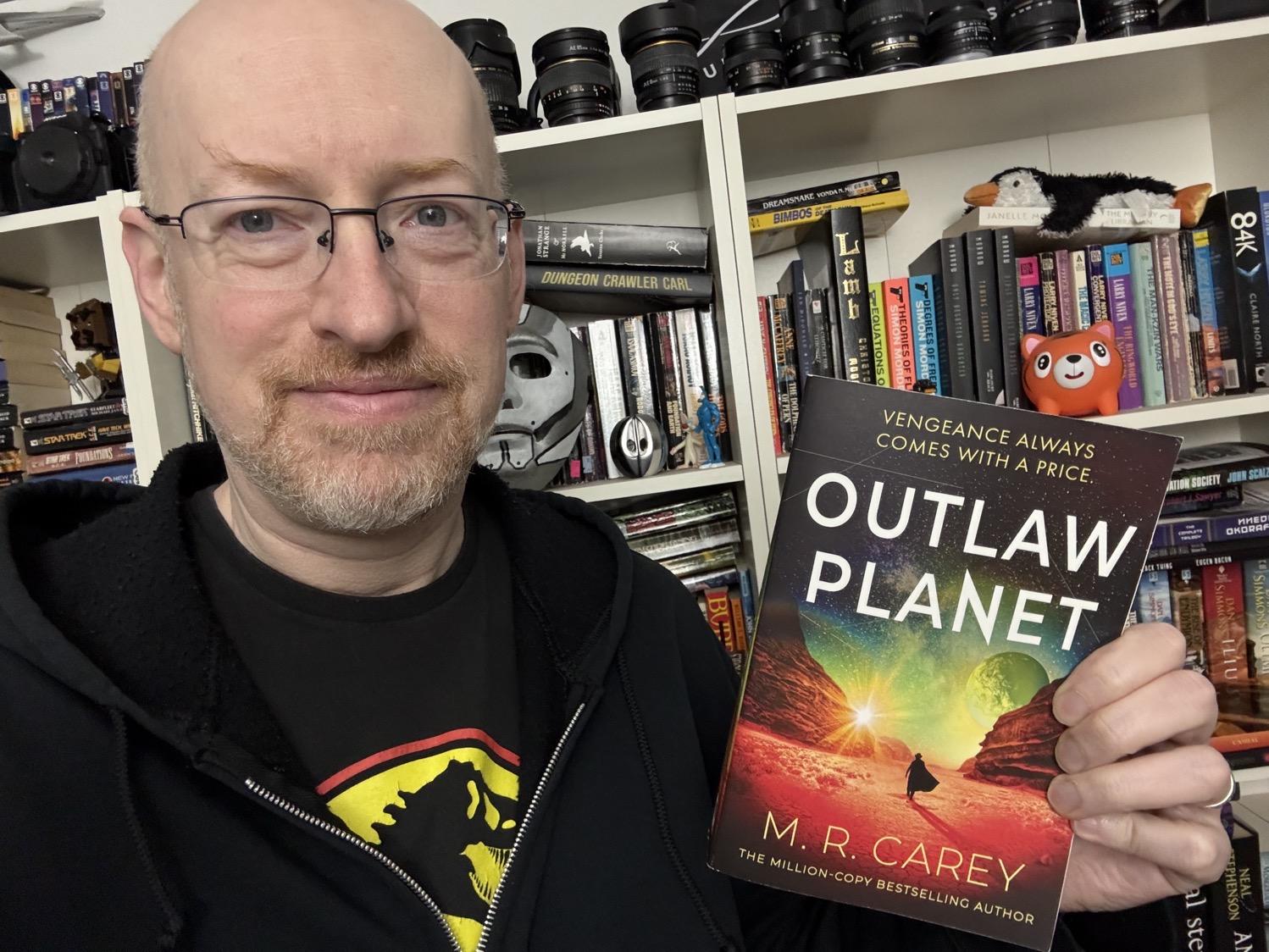
Once again, I missed a week. These things happen! So here we are.
The biggest bits of the last two weeks at work were two afternoons on Zoom for the winter DSSC conference, connecting with disability services workers across the state’s college system, and finishing my annual performance review. Both went well, and for the latter, everyone still likes me, and I have a good set of goals for the next year.
On the home front, our big adventure last weekend was heading into Seattle on Saturday for an(other) anti-ICE protest. This one was primarily organized by Seattle-area higher education unions, and was then joined by health care and tech unions. Ended up being larger than we expected at first, with a rally at Seattle Central College and then a march down to the Federal Building. No clashes, no issues, and a good gathering of like-minded educators (including a co-worker who came along with us), healers, techies, and whomever else wanted to join in. Photos are in this Flickr album.
I’d already had plans to head out to the Mercury to get some goth clubbing in that night, so rather than having me drive back and forth from home to protest to home to club to home, we just got a hotel room nearby. After the protest we got set up in our hotel room, had dinner at a local favorite restaurant (the Annapurna Café), and then my wife got a nice quiet night in a hotel room while I went out bouncing around in a dark goth-y club for a few hours. Sunday we had a lazy, slow morning, came back home, and that was that.
This weekend was a slow Saturday of chores and dozing in front of the Olympics. We’d watched the opening ceremony on Friday evening and, well, were more underwhelmed than overwhelmed.
Today we went out to see Cirque du Soleil’s Echo, which just opened here. Really, really neat show — this was our first time seeing a CDS show, and it was totally worth it.




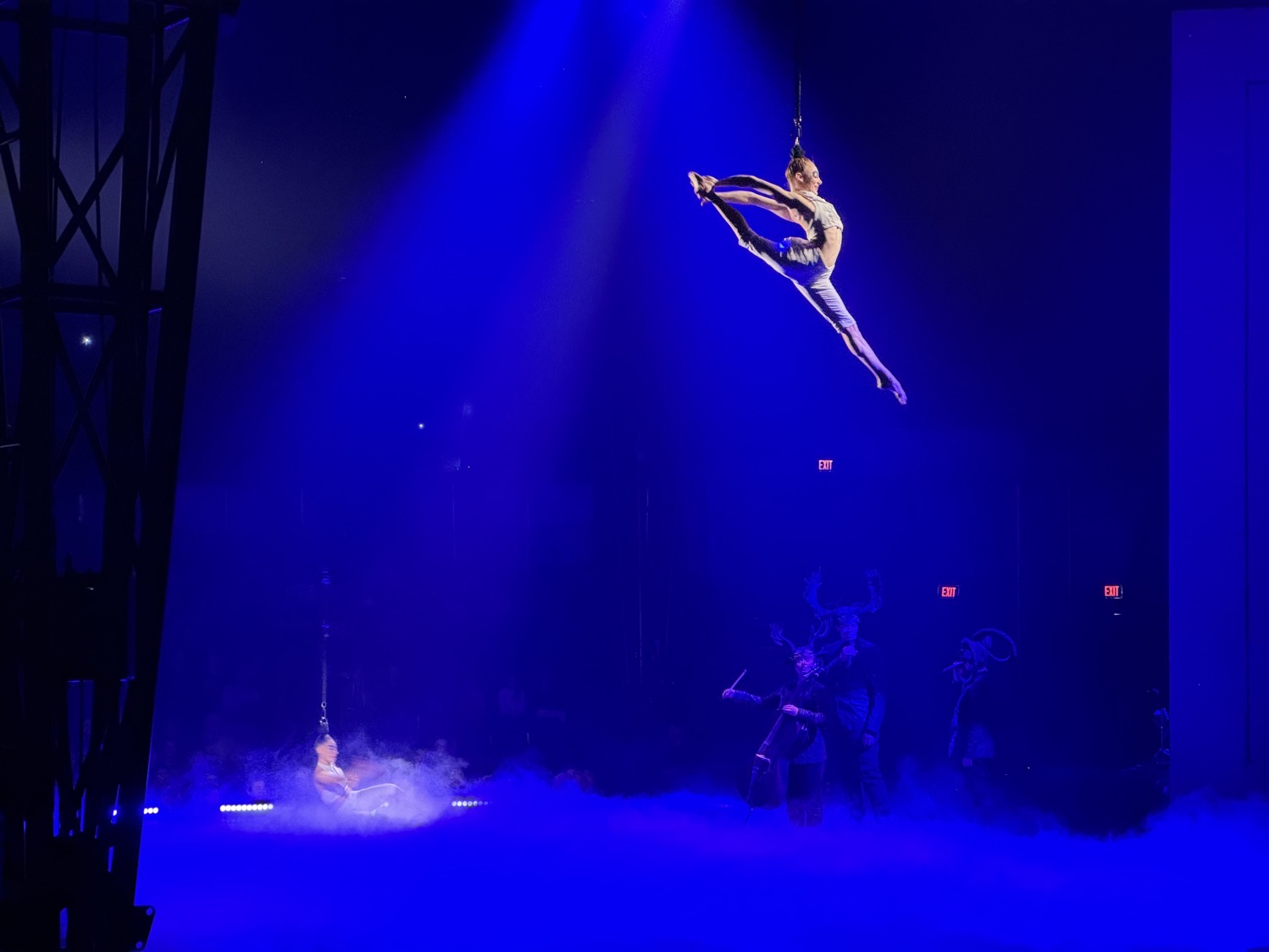
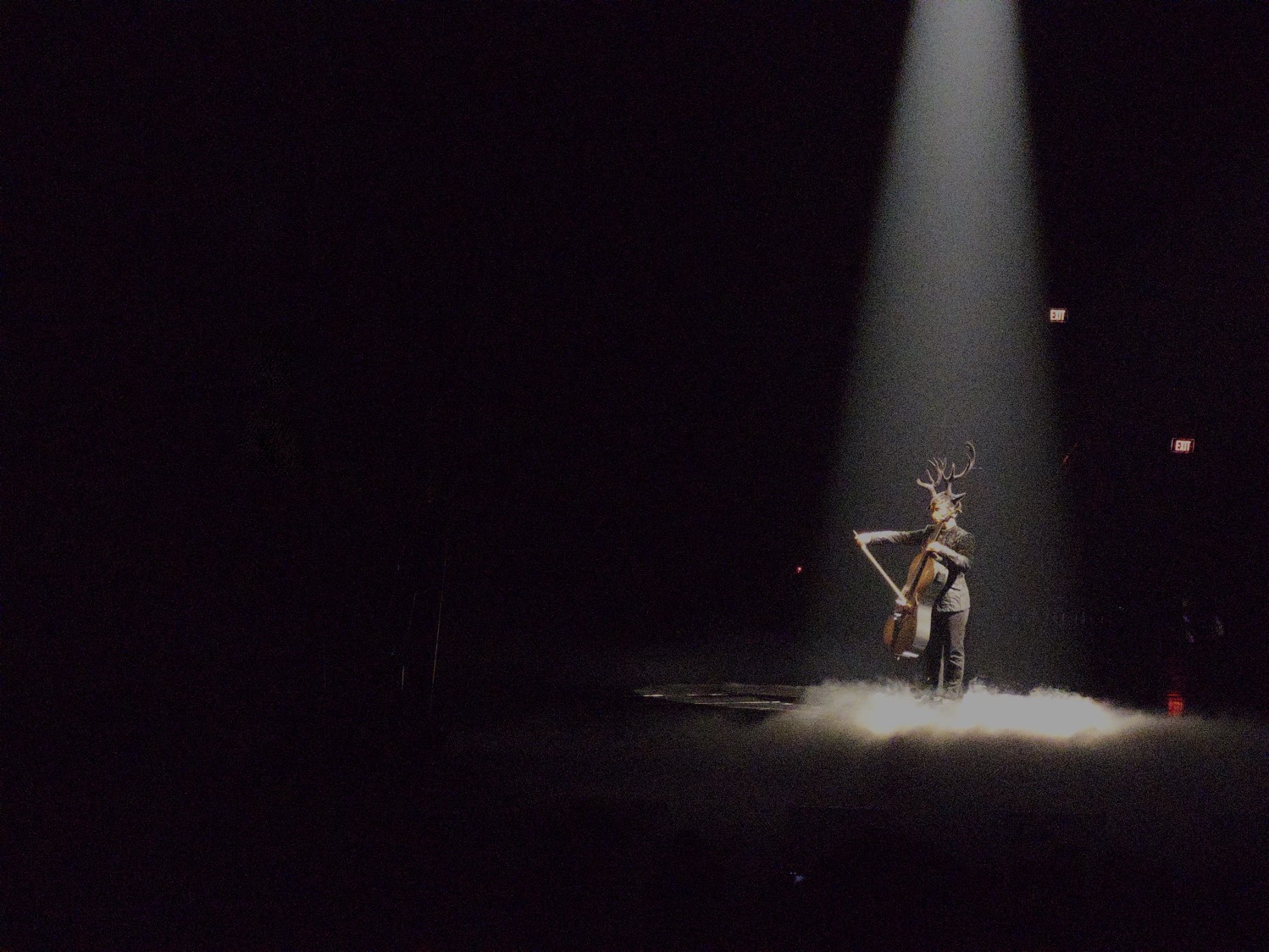
In addition to the little mini-review of the Winter Olympics opening ceremony already linked above, I also had a bit of a bit of a rant on Mastodon about modern Star Trek designing things that look neat rather than feel real. (I actually originally posted it on Bluesky, but it was on Mastodon where I actually got responses and engagement.)
I finished my second of this year’s Philip K. Dick nominees, Oliver K. Langmead and Aliya Whiteley’s City of All Seasons, and have started my third, M. R. Carey’s Outlaw Planet.
We watched the one-off Muppet Show revival, and really enjoyed it. I’ve seen a lot of other people also saying how much they enjoyed it, so hopefully it does get picked up for a full revival.
I found a 2023 article where Consequence posted a list of their picks for the 50 Best Industrial Songs of All Time, and while like any such list, not every choice is one I’d make, it’s not bad. While reading it, I realized that I had most of the tracks on the list already, so I went on a small binge and picked up those I didn’t. So I now have a playlist to match the article, and have been enjoying it and the new additions to my collection.
Plus, these were released recently:
Accessible Social: “Accessible best practices for social media content: Learn how to create a more inclusive online experience one post at a time.”
Laura Kalgan: Accessibility for Everyone: A free edition of this 2017 book on accessibility. Some details might have changed, but accessibility best practices remain the same.
Adam Serwer in The Atlantic: Minnesota Proved MAGA Wrong (gift link; here’s an archive.is link in case the gift link ever expires): “I don’t know what the feds expected when they surged into Minnesota. …what they discovered in the frozen North was something different: a real resistance, broad and organized and overwhelmingly nonviolent, the kind of movement that emerges only under sustained attacks by an oppressive state. Tens of thousands of volunteers—at the very least—are risking their safety to defend their neighbors and their freedom.”
Daphne Carr at Pitchfork: Understanding the LRAD, the “Sound Cannon” Police Are Using at Protests, and How to Protect Yourself From It: “Short-term exposure to loud noise like the LRAD’s deterrent tone may cause a sensation of stuffed or ringing ears, known as tinnitus, which can cease minutes after the exposure or last for days. Other sound injury symptoms include headaches, nausea, sweating, vertigo, and loss of balance. Signs of more serious injury include vomiting and mucus or blood from the ears. Exposure to acute loud sounds can tear eardrums and destroy hair cells in the cochlea, which causes permanent hearing loss.”
Robert F. Worth at The Atlantic: Welcome to the American Winter (archive.is link of a paywalled original): “Again and again, I heard people say they were not protesters but protectors—of their communities, of their values, of the Constitution. Vice President Vance has decried the protests as ‘engineered chaos’ produced by far-left activists working in tandem with local authorities. But the reality on the ground is both stranger and more interesting. The movement has grown much larger than the core of activists shown on TV newscasts, especially since the killing of Renee Good on January 7. And it lacks the sort of central direction that Vance and other administration officials seem to imagine.”
Cheyanne M. Daniels at Politico: Third ‘No Kings’ nationwide protest planned for March: “The group behind the nationwide ‘No Kings’ protests are planning their fourth demonstration of President Donald Trump’s second term — and are anticipating even greater turnout than their earlier rallies.”
Sarah Jeong at The Verge: Best gas masks: “There isn’t a lot of reliable information out there about how to buy a gas mask, especially for the specific purpose of living under state repression. But hopefully after reading this guide you’ll feel equipped to make an educated decision.”
Mia Sato at The Verge: The rise of the slopagandist (gift link; here’s an archive.is link in case the gift link ever expires): “We mostly talk about it in the context of AI-generated material, but slop does not need to be synthetic — AI slop is just a subgenre of a larger type of content that is made quickly and cheaply and poorly. The same lukewarm financial advice peddled by thousands of literal talking heads on Instagram Reels is slop. Falsehoods and oversimplifications about breaking news or contentious celebrity drama that snowball to millions of views is slop. Engagement bait is slop. The president’s social media posts are slop. The main function of slop is to take something from you: your time, your attention, your trust. It is passive in that it requires nothing from viewers but to sit back and consume it. Slop is boring, repetitive, and often inexpensive to make — the natural evolution of an internet built for scale and ruthless optimization.”
Christian Paz at Vox: Minneapolis is showing a new kind of anti-Trump resistance (archive.is link of a paywalled original): “In the Twin Cities area, meanwhile, this activism is well-organized; but it’s not a traditional, anti-government protest movement of the likes we saw during President Donald Trump’s first term. Some have called this new model ‘dissidence’ or ‘neighborism’ — or, more traditionally, ‘direct action.’ As one organizer described what’s happening in the city, ‘it’s kind of unorganized-organized.'”
Just the Browser: “Just the Browser helps you remove AI features, telemetry data reporting, sponsored content, product integrations, and other annoyances from desktop web browsers. The goal is to give you ‘just the browser’ and nothing else, using hidden settings in web browsers intended for companies and other organizations.” For Google Chrome, Microsoft Edge, and Firefox.
Minifigure Scanner: Use this website on your phone to check which figure is in that blind bag before you buy it.
Book 4 of 2026: City of All Seasons by Oliver K. Langmead and Aliya Whiteley.
Second Philip K. Dick award nominee of the year. As such, not reviewed.
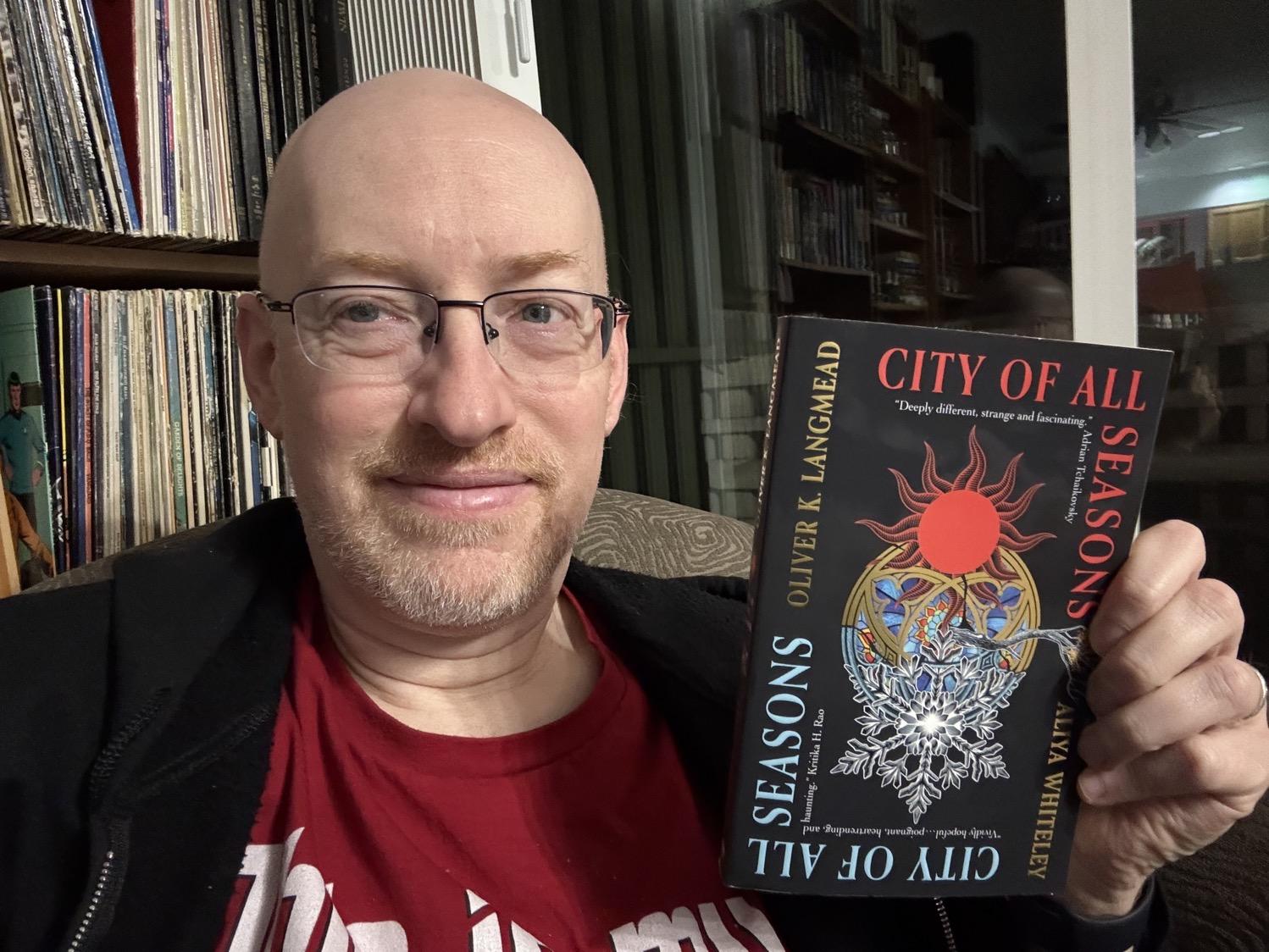
It’s been quite a couple of weeks, hasn’t it?
Two weeks ago, I caught a particularly nasty cold. It was bad enough that we went by urgent care to get tested for flu or Covid. Thankfully, neither of those popped positive, so it really was just a cold, but it meant that I missed a couple days of work. If you can avoid getting the crud this winter (or ever, really), I recommend it; it sounds like everything that’s going around right now is knocking people on their butts.
Over the weekend, we went to the Cougar Mountain Zoo, which we hadn’t explored before. It’s a smaller zoo, but very cute, with a neat collection of bronze statues of animals scattered throughout the grounds. Photos are in a Flickr album as usual.
This past week at work went pretty well, wrapping up with an event where we collaborated with the neurodiversity in education support group Roots2Wings. Highline’s Accessibility Resources department was there in several areas; my area was tabling as part of an accessible technology immersive lab, along with representatives from several other schools and organizations. Not a bad way to wrap up the week.
Out in the wider world, of course, things continue to be an ongoing nuclear dumpster fire. Unsurprisingly, the link roundup at the end of this post will not just be longer than usual (given that this is a two-week catchup), but pretty focused on the wider political shitshow. Maybe eventually things will improve, but for now…oof. Take care of yourselves.
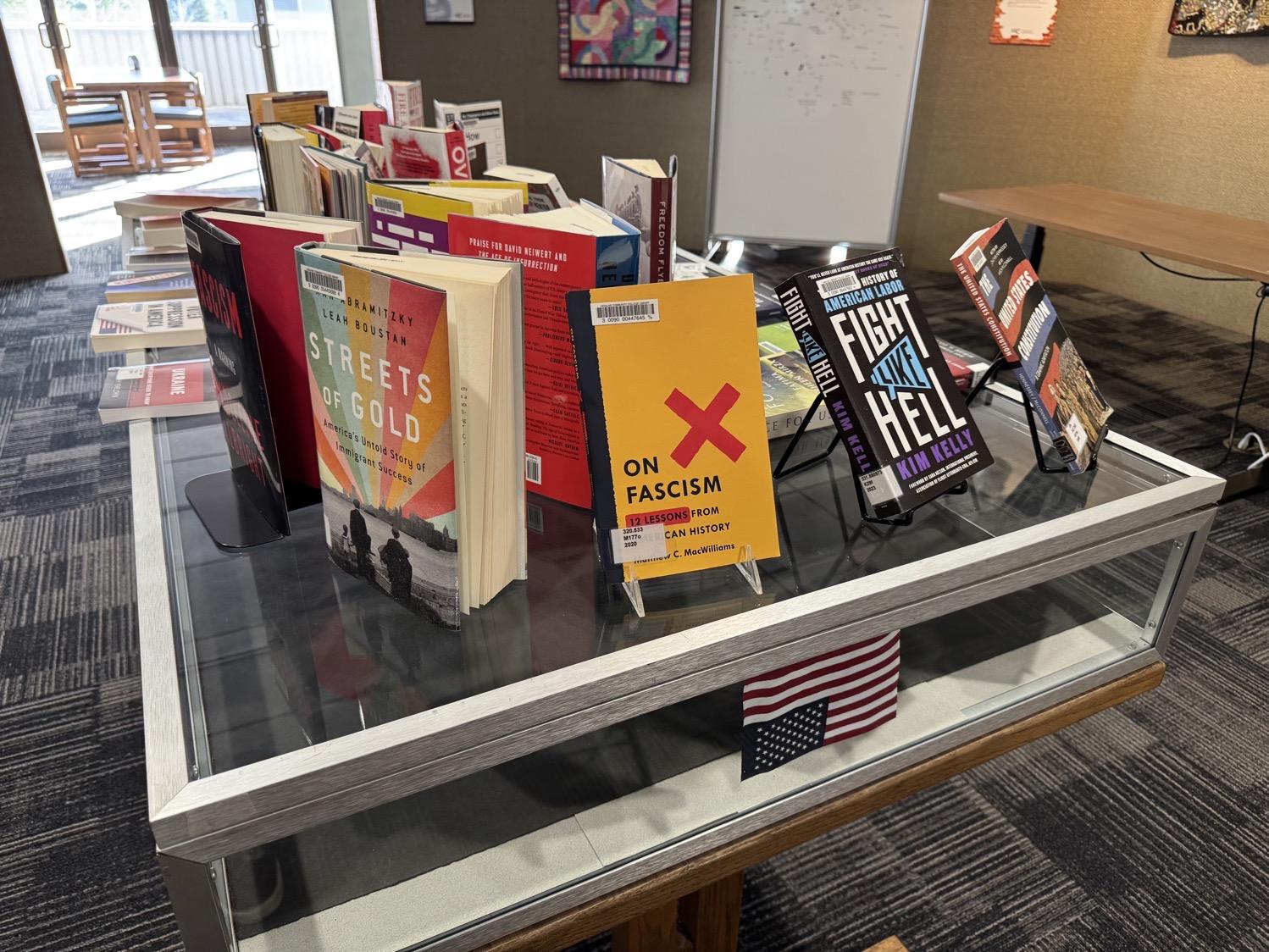
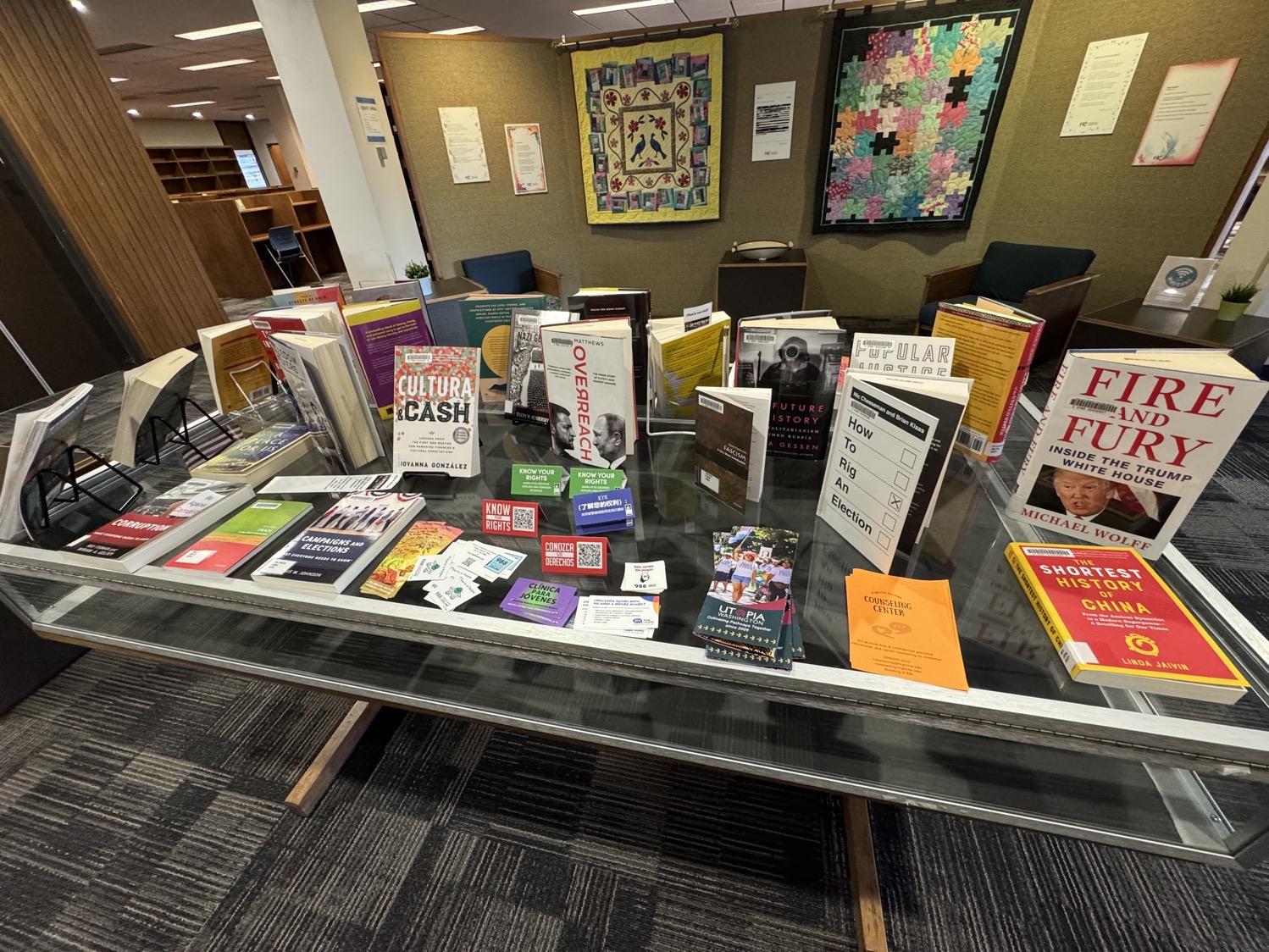

We did not enjoy Thunder Force (2021).
I’m thinking I might start to try categorizing these, particularly when they get this long…
Unstream: Find your favorite music on alternative platforms, directly support the artists you love, and move off streaming.
Iceout.org: Tracking ICE sightings, interactions, and abductions across the country. “Our objective is to collect community-submitted information about possible ICE activity to help inform the public and raise awareness. All reports are reviewed by our moderator team before appearing on the map.”
Danielle Chelosky at Stereogum: Bandcamp Bans AI Music: “Bandcamp is banning AI music. ¶ The platform made the announcement today via Reddit….”
Amanda Silberling at TechCrunch: Amazon’s Ring to partner with Flock, a network of AI cameras used by ICE, feds, and police: “Amazon’s surveillance camera maker Ring announced a partnership on Thursday with Flock, a maker of AI-powered surveillance cameras that share footage with law enforcement.”
Anil Dash: How Markdown Took Over The World: “If markup is complicated, then the opposite of that complexity must be… markdown. This kind of solution, where it’s so smart it seems obvious in hindsight, is key to Markdown’s success. John worked to make a format that was so simple that anybody could pick it up in a few minutes, and powerful enough that it could help people express pretty much anything that they wanted to include while writing on the internet.” I’ve been using Markdown regularly for, well, decades now, since shortly after it was released, thanks to word spreading among the MovableType community. Nearly every post on this blog is Markdown (or a mix of Markdown and HTML).
Ryan Broderick at Garbage Day: We’re all just content for ICE: “…ICE agents make no effort to hide what ‘side’ they’re on. I’ve seen up close how intertwined the twin engines of the Trump regime are. Brutal state violence and hysterical right-wing internet content work together in lockstep. According to The Washington Post, the agency is under pressure from The White House to create as much content as possible. Which is why ICE agents have a phone in one hand and a gun in the other. But it goes beyond that.”
Miles Klee at Rolling Stone: Professor Forbidden To Teach Plato Assigns Article About University Censorship Instead: “Rather than teach a different course, Peterson elected to revise his syllabus, replacing the Plato readings with an article in The New York Times about the university’s censorship of the original material. Administrators have approved the change, he says, and he’s looking forward to teaching it in the context of free speech and academic freedom issues. ‘It’s going to be very, very fun,’ he says. Students who received the amended syllabus also found it annotated to highlight exactly what the school had forbidden Peterson from assigning and which alternative material had been added as a result.”
Ian Millhiser at Vox: The Supreme Court is about to confront its most embarrassing decision (archive.is link of a paywalled original): “It appears, in other words, that Americans around the time of the nation’s founding and the ratification of the Second Amendment were quite comfortable with laws banning gun possession on private land without the land owner’s permission. That should be enough to uphold Hawaii’s law under Bruen’s ‘historical tradition of firearm regulation’ standard. But it’s not that simple.”
Madison McVan at the Minnesota Reformer: In the car with the Minneapolis community patrols working to disrupt ICE operations: “Neubauer and O’Keefe started patrolling their south Minneapolis neighborhood recently as the Trump administration has ramped up its mass deportation campaign in Minnesota, sending in thousands of ICE and Border Patrol agents, with more on the way. They are some of the many thousands of Twin Cities residents who have come together over the past year to protest ICE and divert the agents from their mission, often resulting in tense confrontations.”
Sarah Raza at the AP: Minneapolis duo details their ICE detention, including pressure to rat on protest organizers: “According to organizers and an American Civil Liberties Union lawsuit, immigration officers have also been surveilling activists who have been observing their activities in the Twin Cities, violating their First Amendment rights. And Sigüenza, who like his friend O’Keefe is a U.S. citizen, said an immigration officer who questioned him Sunday even offered him money or legal protection if he gave up the names of organizers or neighbors who are in the country illegally.”
Laura Jedeed at Slate: You’ve Heard About Who ICE Is Recruiting. The Truth Is Far Worse. I’m the Proof.: “Somehow, despite never submitting any of the paperwork they sent me—not the background check or identification info, not the domestic violence affidavit, none of it—ICE had apparently offered me a job.”
Solarbird: What’s Permuting Itself Around In My Head, Part Two: The Election: “Christ, this all sounds so stupid, doesn’t it? It sounds like such conspiracy theory bullshit. But I remind myself and you both that this was the 2020-2021 plan, and they almost pulled it off. With someone like J.D. ‘Couchfucker’ Vance in place of Mike Pence, you know the elector count would’ve stalled out. It’s not even a question. ¶ So as thick, as just fucking dumb as all this is… ¶ …we have to be ready for it. At very least, we have to be watching very carefully for the same progress steps as were clearly visible last time.”
Mike Masnick at TechDirt: Everyone Knows Our Mad King’s Greenland Obsession Is Insane. Why Won’t Congress Stop It?: “A President who openly admits his foreign policy is driven by personal grievances over awards he didn’t receive is not fit for office. A President who threatens to invade NATO allies and won’t rule out military force against them is a danger to global stability. A President who doesn’t understand (or doesn’t care) that the Nobel Committee is independent from the Norwegian government has no business conducting diplomacy. ¶ These aren’t controversial statements. They’re obvious. Everyone knows it. ¶ But none of the political elite want to act.”
Sam Levin at The Guardian: ICE detains five-year-old Minnesota boy arriving home, say school officials: “Liam Ramos, a preschooler, and his father were taken into custody while in their driveway, the superintendent of the school district in Columbia Heights, a Minneapolis suburb, said at a press conference on Wednesday. Liam, who had recently turned five, is one of four children in the school district who have been detained by federal immigration agents during the Trump administration’s enforcement surge in the region over the last two weeks, the district said.”
Meg Anderson at NPR: The ICE surge is fueling fear and anxiety among Twin Cities children: “Parents, teachers, counselors and health care workers across the Twin Cities say many Minnesota children are living in fear or seeing those fears realized. They worry loved ones will be taken away, that they’ll witness violence, or get hurt themselves.”
Sofia Barnett at The Minnesota Star Tribune: Two women, detained by ICE, say they helped agent having seizure: “By the time emergency medical responders arrived, the women had been holding the agent steady for several minutes. They were detained but acting as first responders to the man who had detained them. ¶ Once the agent was transferred to medical care, Amundson and Zemien were placed into another vehicle and driven to Whipple anyway. ¶ ‘I asked if we could just go home,’ Amundson said. ‘I said, ‘We just saved his life. Is that cool with you?’ And they said no.'”
Derek Guy at Politico: There’s More to Greg Bovino’s Coat Than You Think: “Like field shirts, trenchcoats and combat boots, the greatcoat belongs to a shared military vocabulary that predates fascism and has been used by military forces around the world. […] Bovino’s coat may not be a Hitlerian symbol, but it is a symbol for something else: the increasing militarization of immigration enforcement.” I’m not entirely sure I agree with part of the article’s premise, that Bovino isn’t referencing the Nazi’s uniforms — from here, there’s no way to be sure, but I wouldn’t be at all surprised if he was — but the history and fashion shift over the years is interesting.
Dan Sinker: We Are All We Have: “We are all we have and the more you do, today, to reach out in your neighbors, your town, your community, the better off everyone is. ¶ Right now feels impossible, and unfortunately there’s a lot of impossible still to come. There’s no fast fix, no one easy trick to defeating fascism. ¶ But. ¶ But honestly I’ve never felt more hopeful that we actually have what it takes. That we can do the impossible, even when it seems insurmountable. ¶ Because what it takes is us.”
Book 3 of 2026: Casual by Koji A. Dae.
First Philip K. Dick award nominee of the year. As such, not reviewed.
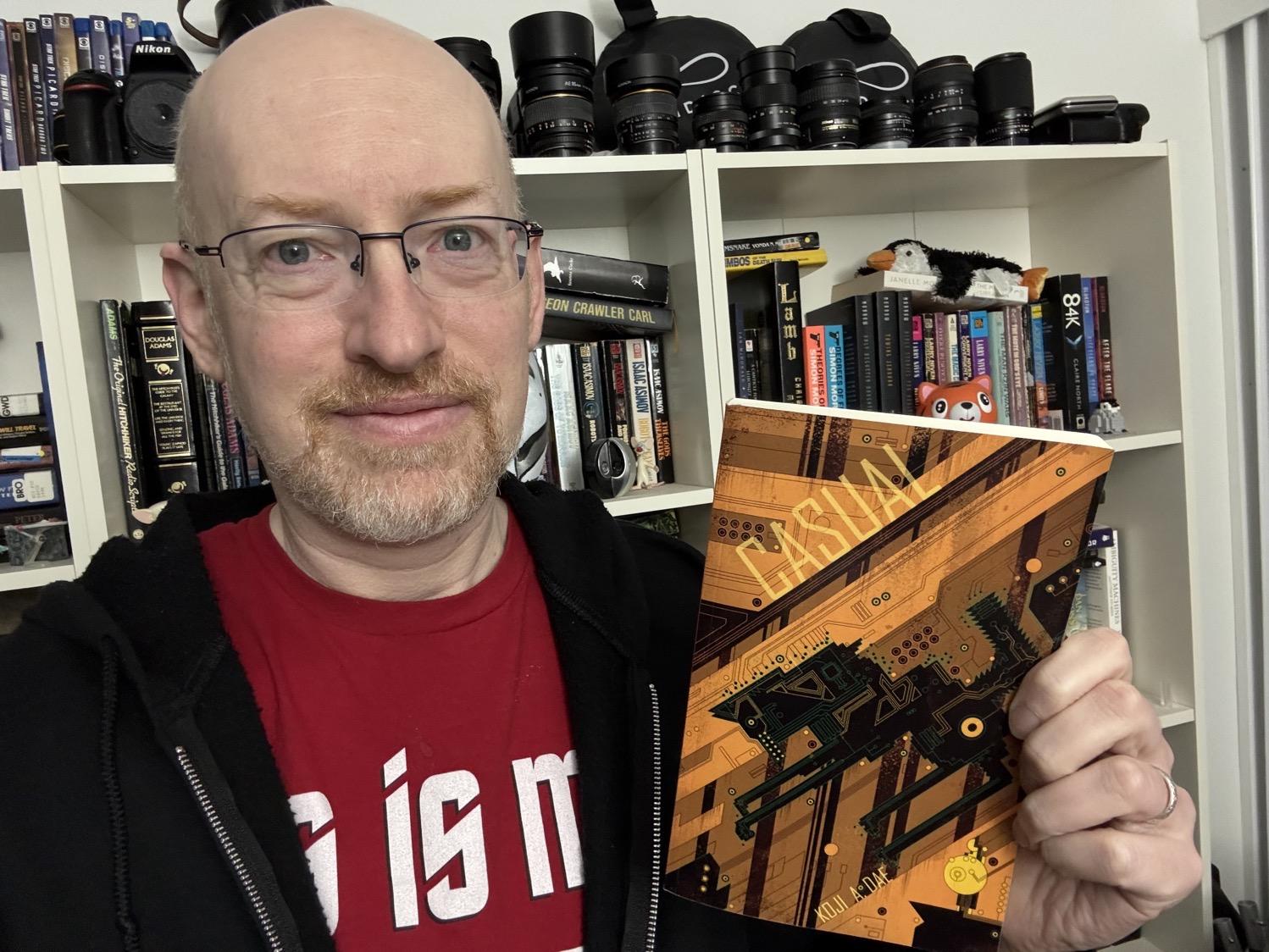
Just a brief update to my prior Affinity by Canva Accessible PDF Output Test post. As Affinity recently updated to v3.0.2, I ran the test again.
The results are nearly identical; the only change I noticed was a regression: The footer text on the master page now appears once at the very bottom of the tag tree instead of being properly artifacted out. In the prior version of this test using Affinity 3.0.1, the footer text was properly omitted from the tag tree.
Updated versions of the test file and output may be downloaded if you’d like to play along at home: